新概念英语第一册第109课Lesson109课文单词知识点.doc
- 格式:doc
- 大小:109.00 KB
- 文档页数:2
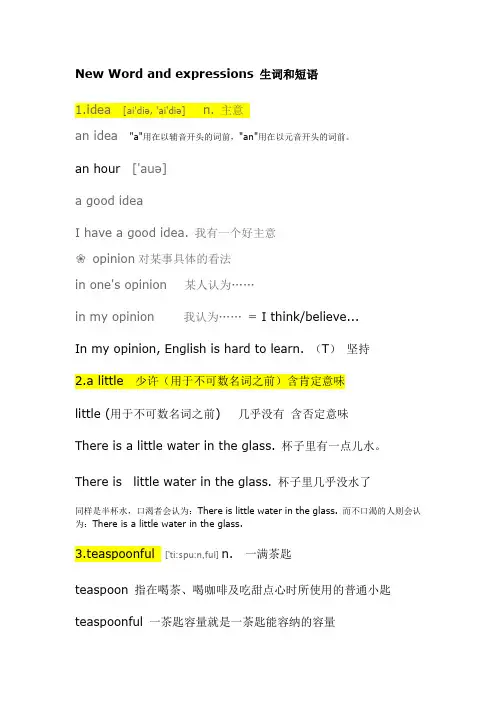
New Word and expressions 生词和短语1.idea [ai'diə, 'ai'diə] n. 主意an idea "a"用在以辅音开头的词前,"an"用在以元音开头的词前。
an hour ['auə]a good ideaI have a good idea. 我有一个好主意❀opinion对某事具体的看法in one's opinion 某人认为……in my opinion 我认为……= I think/believe...In my opinion, English is hard to learn. (T)坚持2.a little 少许(用于不可数名词之前)含肯定意味little (用于不可数名词之前) 几乎没有含否定意味There is a little water in the glass. 杯子里有一点儿水。
There is little water in the glass. 杯子里几乎没水了同样是半杯水,口渴者会认为:There is little water in the glass. 而不口渴的人则会认为:There is a little water in the glass.3.teaspoonful ['ti:spu:n,ful] n. 一满茶匙teaspoon 指在喝茶、喝咖啡及吃甜点心时所使用的普通小匙teaspoonful 一茶匙容量就是一茶匙能容纳的容量a teaspoonful of sugar4.Less adj. (little 的比较级)较少的,更小的1) 规则变化单音节词和少数双音节词,加词尾-er,-est来构成比较级和最高级。
①一般单音节词未尾加-er,-est :tall(高的) taller tallestgreat(巨大的) greater greatest②以不发音的e结尾的单音词和少数以- le结尾的双音节词只加-r,-st :nice(好的) nicer nicest large(大的) larger largest able(有能力的) abler ablest③以一个辅音字母结尾的闭音节(必须是重读音节;最后只有一个辅音字母;元音字母发短元音)单音节词,双写结尾的辅音字母再加-er,-est :big(大的) bigger biggest hot热的) hotter hottest④"以辅音字母+y" 结尾的双音节词改y为i,再加-er,-est easy(容易的) :easier easiest busy(忙的) busier busiest⑤少数以-er,-ow结尾的双音节词未尾加-er,-est :clever(聪明的) cleverer cleverest ;narrow(窄的) narrower narrowest ⑥其他双音节词和多音节词,在前面加来构成比较级和最高级:important(重要的) more important most important easily(容易地) more easily most easily2)不规则变化good/well(好的)/ better bestbad (坏的)/ill(有病的) :/ worse worstold -> older -> oldest老,年龄大-> elder -> eldest排行比较elder sister姐姐much/many(多的) more mostlittle(少的) less leastfar -> farther -> farthest指距离/-> further -> furthest表示程度further study进修学习/further explanation进一步的解释5.a few(= some; several; a small number of) 含肯定意义。
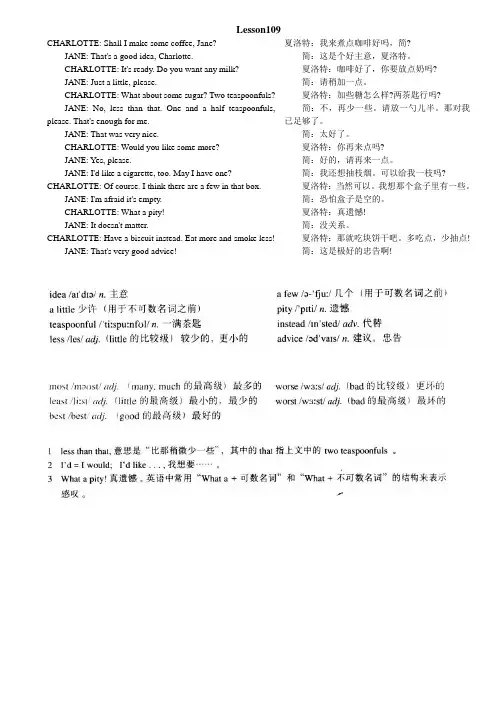
Lesson109CHARLOTTE: Shall I make some coffee, Jane?JANE: That's a good idea, Charlotte.CHARLOTTE: It's ready. Do you want any milk?JANE: Just a little, please.CHARLOTTE: What about some sugar? Two teaspoonfuls?JANE: No, less than that. One and a half teaspoonfuls, please. That's enough for me.JANE: That was very nice.CHARLOTTE: Would you like some more?JANE: Yes, please.JANE: I'd like a cigarette, too. May I have one? CHARLOTTE: Of course. I think there are a few in that box.JANE: I'm afraid it's empty.CHARLOTTE: What a pity!JANE: It doesn't matter.CHARLOTTE: Have a biscuit instead. Eat more and smoke less!JANE: That's very good advice! 夏洛特:我来煮点咖啡好吗,简?简:这是个好主意,夏洛特。
夏洛特:咖啡好了,你要放点奶吗?简:请稍加一点。
夏洛特:加些糖怎么样?两茶匙行吗?简:不,再少一些。
请放一勺儿半。
那对我已足够了。
简:太好了。
夏洛特:你再来点吗?简:好的,请再来一点。
简:我还想抽枝烟。
可以给我一枝吗?夏洛特:当然可以。
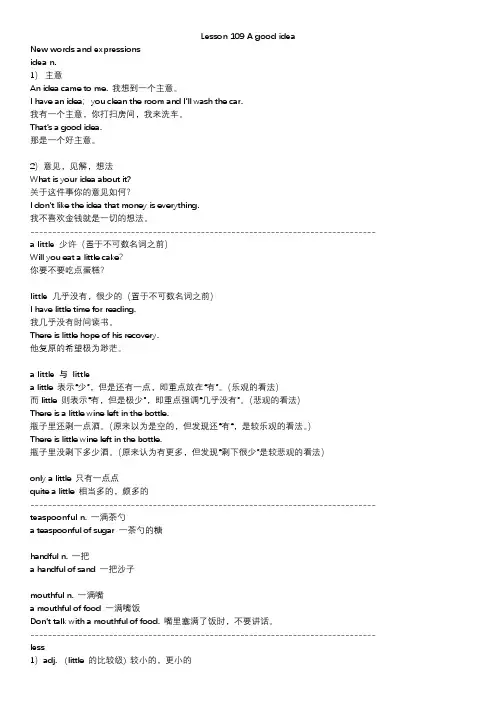
Lesson 109 A good ideaNew words and expressionsidea n.1)主意An idea came to me. 我想到一个主意。
I have an idea;y ou clean the room and I’ll wash the car.我有一个主意,你打扫房间,我来洗车。
Tha t’s a good idea.那是一个好主意。
2)意见,见解,想法What is your idea about it?关于这件事你的意见如何?I don’t like the idea that money is everything.我不喜欢金钱就是一切的想法。
------------------------------------------------------------------------------- a little少许(置于不可数名词之前)Will you eat a little cake?你要不要吃点蛋糕?little几乎没有,很少的(置于不可数名词之前)I have little time for reading.我几乎没有时间读书。
There is little hope of his recovery.他复原的希望极为渺茫。
a little 与littlea little 表示“少”,但是还有一点,即重点放在“有”。
(乐观的看法)而little 则表示“有,但是极少”,即重点强调“几乎没有”。
(悲观的看法)There is a little wine left in the bottle.瓶子里还剩一点酒。
(原来以为是空的,但发现还“有“,是较乐观的看法。
)There is little wine left in the bottle.瓶子里没剩下多少酒。
(原来认为有更多,但发现“剩下很少”是较悲观的看法)only a little 只有一点点quite a little 相当多的,颇多的------------------------------------------------------------------------------- teaspoonful n. 一满茶勺a teaspoonful of sugar 一茶勺的糖handful n. 一把a handful of sand 一把沙子mouthful n. 一满嘴a mouthful of food 一满嘴饭Don’t talk with a mouthful of food. 嘴里塞满了饭时,不要讲话。
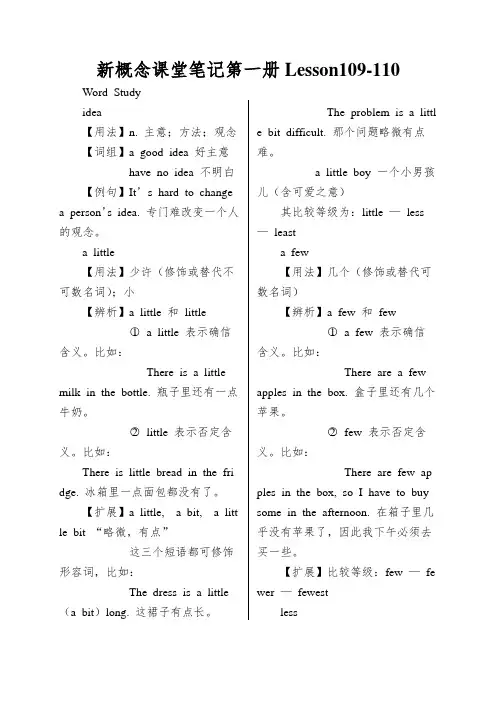
新概念课堂笔记第一册Lesson109-110 Word Studyidea【用法】n. 主意;方法;观念【词组】a good idea 好主意have no idea 不明白【例句】It’s hard to change a person’s idea. 专门难改变一个人的观念。
a little【用法】少许(修饰或替代不可数名词);小【辨析】a little 和little○1 a little 表示确信含义。
比如:There is a little milk in the bottle. 瓶子里还有一点牛奶。
○2little 表示否定含义。
比如:There is little bread in the fri dge. 冰箱里一点面包都没有了。
【扩展】a little, a bit, a litt le bit “略微,有点”这三个短语都可修饰形容词,比如:The dress is a little (a bit)long. 这裙子有点长。
The problem is a littl e bit difficult. 那个问题略微有点难。
a little boy 一个小男孩儿(含可爱之意)其比较等级为:little —less —leasta few【用法】几个(修饰或替代可数名词)【辨析】a few 和few○1 a few 表示确信含义。
比如:There are a few apples in the box. 盒子里还有几个苹果。
○2few 表示否定含义。
比如:There are few ap ples in the box, so I have to buy some in the afternoon. 在箱子里几乎没有苹果了,因此我下午必须去买一些。
【扩展】比较等级:few —fe wer —fewestless【用法】adj. 较少的,更小的(little的比较级)【词组】less than 少于no less than 多达,与……一样,许多于pity【用法】n. 遗憾【词组】take a pity on 同情【扩展】pitiful adj. 悲伤的,可鄙的instead【用法】adv. 代替【词组】instead of 代替,而不是……【辨析】instead 和instead of○1instead 位于句首或句尾,是副词。
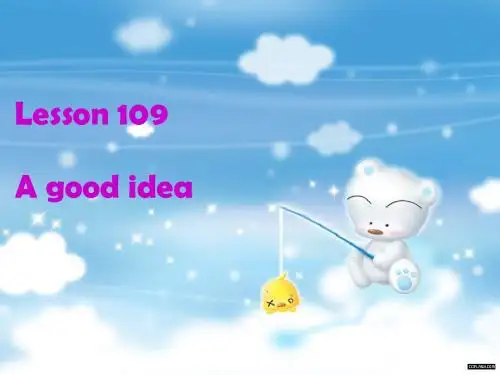
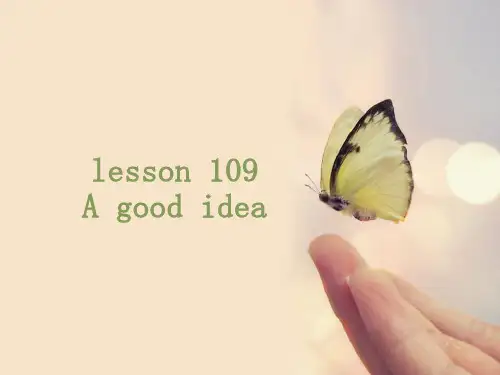
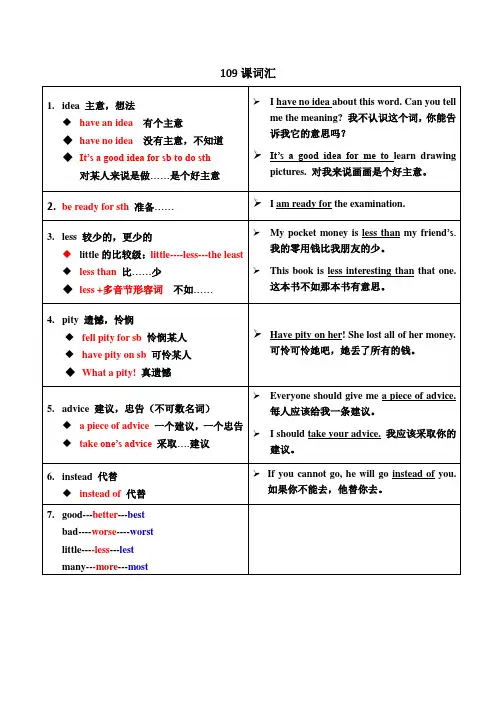
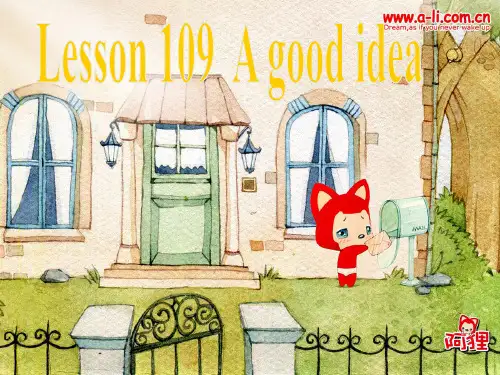
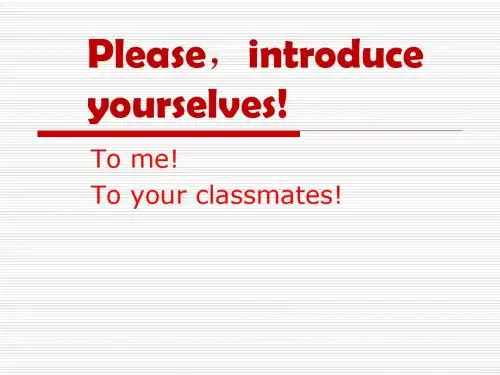
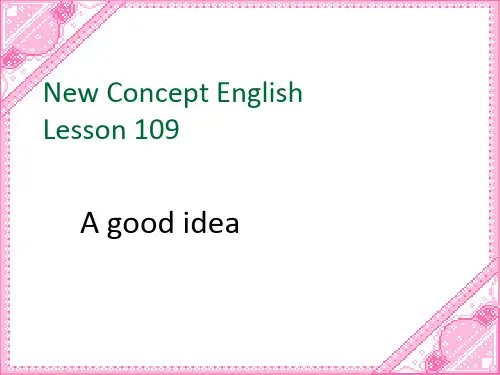

Lesson109CHARLOTTE: Shall I make some coffee, Jane?JANE: That's a good idea, Charlotte.CHARLOTTE: It's ready. Do you want any milk?JANE: Just a little, please.CHARLOTTE: What about some sugar? Two teaspoonfuls?JANE: No, less than that. One and a half teaspoonfuls,please. That's enough for me.JANE: That was very nice.CHARLOTTE: Would you like some more?JANE: Yes, please.JANE: I'd like a cigarette, too. May I have one?CHARLOTTE: Of course. I think there are a few in that box.JANE: I'm afraid it's empty.CHARLOTTE: What a pity!JANE: It doesn't matter.CHARLOTTE: Have a biscuit instead. Eat more and smoke less!JANE: That's very good advice!夏洛特:我来煮点咖啡好吗,简?简:这是个好主意,夏洛特。
夏洛特:咖啡好了,你要放点奶吗?简:请稍加一点。
夏洛特:加些糖怎么样?两茶匙行吗?简:不,再少一些。
请放一勺儿半。
那对我已足够了。
简:太好了。
夏洛特:你再来点吗?简:好的,请再来一点。
简:我还想抽枝烟。
可以给我一枝吗?夏洛特:当然可以。
新概念英语第⼀册109-110课课⽂知识点 further notes on the text1.just a little, please.请稍加⼀点⼉。
a little (=some),⼀些/⼀点,⽤于修饰不可数名词。
⼜如:a little money/ water/coffee⼀点⼉钱/⽔/咖啡a few (=some,severa1) 则⽤于可数名词。
2.one and a half teaspoonfuls, please.请放⼀勺⼉半。
在英语中,⽐1⼤的东西,即使⽐2⼩,也需⽤复数表⽰。
3.may i…?我可以……吗?表⽰“请求”或“请求允许”。
4.it doesn't matter.没关系。
这是表⽰此意的⼏种常⽤说法之⼀。
5.省略more than you have中 have后省略了 got。
下⽂中的 less than you have和fewer than you have同此。
more than表⽰“⽐……多”; less than表⽰“⽐……少”; fewer than表⽰“⽐……少”(⽤于可数名词)。
i've got the most中 most后省略了 chocolate。
形容词的级之后的名词在意思清楚的时候可省略。
下⽂中的 the least同此。
the fewest后省略了 mistakes。
6.i've ever seen,我所见过的。
定语从句,分别修饰 the best,the worst。
新概念英语第⼀册109-110课语法知识点 grammar in use1.不规则形容词的⽐较级和级不规则形容词的⽐较级和级例举如下:good----better----bestbad----worse----worstmany/much----more----mostlittle----less----leastfar----farther----farthest----further----furthest2.名词的数与修饰词可数名词的多与少,⽤many与few来表达;不可数名词的多与少,则⽤much与little来表达:i've got some biscuits. 我有饼⼲。
新概念英语3B级别Lesson109-114复习资料Lesson 109-110征求别人意见的表达方式:Shall I…? 向别人征询意见,一般将来时中,可用Shall代替Will.Do you want...?What about...?Would you like some coffee/beer? some 可用在征询意见中May i ...?1. idea 主意, 意见(不可数名词)idea 含义较广opinion [ə'pɪnjən] 对某事具体的看法view 侧重个人意见a good idea 好主意in one's opinion 在某人看来in my opinionI have a good idea.2. Just a little,please.请稍加一点儿。
a few (=some,severa1) 则用于可数名词。
a little 修饰不可数名词,表示肯定含义a little money/ water/coffeelittle 修饰不可数名词,表示否定含义a few 修饰可数名词,表示肯定含义few 修饰可数名词,表示否定含义I have a little milk. I have little milk.She has a few friends. She has few friends.3. One and a half teaspoonfuls,please.请放一勺儿半。
在英语中,比1大的东西,即使比2小,也需用复数表示。
Two teaspoonfuls?合成词:tea+spoon+ful →handful 一把 a handful of sand 一把沙子4.less than 表示“比……少”;fewer than表示“比……少”(用于可数名词)。
more than 表示“比……多”;5.What a pity! = What a shame! 真遗憾!感叹句:What + (a/an) + (adj) + n.+(主+谓)例句:What a beautiful flower it is! What beautiful flowers they are!It doesn’t matter.=Never mind.= It’s all right. 没关系。
新概念英语第一册Lesson109~113生词和短语新概念英语第一册Lesson109生词和短语idea /ai'diə/ n.主意a little少许(用于不可数名词之前)teaspoonful /'ti:spu:nfl/ n.一满茶匙less /les/ adj.(little的比较级)较少的,更小的a few /ə-'fju:/ 几个(用于可数名词之前)pity /'piti/ n.遗憾instead /in'sted/ adv.代替advice /əd'vais/ n.建议,忠告新概念英语第一册Lesson110生词和短语most/məust/adj.(many, much的级)最多的least/li:st/adj.(little的级)最小的,最少的best/best/adj.(good的级)的Worse/wə:s/adj.(bed的比较级)更坏的worst/wə:st/adj.(bad的级)最环的新概念英语第一册Lesson111生词和短语model /'modl/ n.型号,式样afford /ə'fɔ:d/ v.付得起(钱)deposit /di'pɔzit/ n.预付定金instalment /in'stɔ:lmənt/ n.分期付款price /prais/ n.价格millionaire /'miljə'neə/ n.百万富翁新概念英语第一册Lesson112生词和短语conductor /kən'dʌktə/ n.售票员fare /feə/ n.车费,车票passenger /'pæsindʒə/ n.乘客none /nʌn/ pron.没有任何东西neither /'naieə/ adv.也不get off下车tramp /træmp/ n.流浪汉except /ik'sept/ prep.除……外新概念英语第一册Lesson113生词和短语anyone /'eniwʌn/ pron.(用于疑问句,否定式)任何人knock /nɔk/ v.敲,打everything /'evriθiŋ/ pron.一切事物quiet /'kwaiət/ adj.宁静的,安静的impossible /Im'pɔsIbəl/ adj.不可能的invite /In'vaIt/ v.邀请anything /'eniθiŋ/ pron.任何东西lemonade /'lemə'neId/ n.柠檬水。
新概念英语第一册自学笔记含课后练习答案:Lesson109-110新概念英语第一册109-110课课文知识点 further notes on thetext1.just a little, please.请稍加一点儿。
a little (=some),一些/一点,用于修饰不可数名词。
又如:a little money/ water/coffee一点儿钱/水/咖啡a few (=some,severa1) 则用于可数名词。
2.one and a half teaspoonfuls, please.请放一勺儿半。
在英语中,比1大的东西,即使比2小,也需用复数表示。
3.may i…?我能够……吗?表示“请求”或“请求允许”。
4.it doesn't matter.没关系。
这是表示此意的几种常用说法之一。
5.省略more than you have中 have后省略了 got。
下文中的 less than you have和fewer than you have同此。
more than表示“比……多”; less than表示“比……少”; fewer than表示“比……少”(用于可数名词)。
i've got the most中 most后省略了 chocolate。
形容词的级之后的名词在意思清楚的时候可省略。
下文中的 the least同此。
the fewest后省略了 mistakes。
6.i've ever seen,我所见过的。
定语从句,分别修饰 the best,the worst。
新概念英语第一册109-110课语法知识点 grammar in use1.不规则形容词的比较级和级不规则形容词的比较级和级例举如下:good----better----bestbad----worse----worstmany/much----more----mostlittle----less----leastfar----farther----farthest----further----furthest2.名词的数与修饰词可数名词的多与少,用many与few来表达;不可数名词的多与少,则用much与little来表达:i've got some biscuits.我有饼干。
Lesson109
CHARLOTTE: Shall I make some coffee, Jane?
JANE: That's a good idea, Charlotte.
CHARLOTTE: It's ready. Do you want any milk?
JANE: Just a little, please.
CHARLOTTE: What about some sugar? Two teaspoonfuls?
JANE: No, less than that. One and a half teaspoonfuls,
please. That's enough for me.
JANE: That was very nice.
CHARLOTTE: Would you like some more?
JANE: Yes, please.
JANE: I'd like a cigarette, too. May I have one?
CHARLOTTE: Of course. I think there are a few in that box.
JANE: I'm afraid it's empty.
CHARLOTTE: What a pity!
JANE: It doesn't matter.
CHARLOTTE: Have a biscuit instead. Eat more and smoke less!
JANE: That's very good advice!
夏洛特:我来煮点咖啡好吗,简?
简:这是个好主意,夏洛特。
夏洛特:咖啡好了,你要放点奶吗?
简:请稍加一点。
夏洛特:加些糖怎么样?两茶匙行吗?
简:不,再少一些。
请放一勺儿半。
那对我
已足够了。
简:太好了。
夏洛特:你再来点吗?
简:好的,请再来一点。
简:我还想抽枝烟。
可以给我一枝吗?
夏洛特:当然可以。
我想那个盒子里有一些。
简:恐怕盒子是空的。
夏洛特:真遗憾!
简:没关系。
夏洛特:那就吃块饼干吧。
多吃点,少抽点!
简:这是极好的忠告啊!
【知识点讲解】
一. 今天我们继续讲比较级:
在107课,我们介绍了比较与最高级的变化的一般规律,但是比较级跟最高级也有特殊的变化,下面列举其中的一小部分,供大家参考。
但更多的不规则变化,需要同学们在今后的学习中不断地去积累与巩固。
good/well-better-best(好的) bad/badly-worse-worst(坏的) old-older/elder-oldest/eldest (老的,年长的) much/many-more-most (多的) little/few-less-least (少的) far-farther/further-farthest/furthest(远的)
小问题:本课中有比较级,最高级的不规则变化吗?
二. 在征询别人意见的时候,可以这么说:Shall I+V? 我可以……?“我可以在你房间吸烟吗?”应该怎么说呢?
三. 建议的提出与采纳用语:
提出建议:What about+n/Ving或How about+n/Ving? 或者是Why not+ V?/Let's + V.
小问题:“去公园走走,怎样?”又应该怎样说呢?
采纳用语: That's a good idea! 好主意! It sounds good/nice/pretty!听起来不错!
考虑中:Give me some minutes to think about it! 给我点时间考虑一下。
四:部分重点单词讲解:
1. a few 与a little都表示一点,一些,但跟在它们后边的名词是不一样的,a few 是用来形容可数名词,而 a little 则用来形容不可数名词。
这种区别同样适用于few&little,many&much (每一组的前者均修饰可数名词,后者修饰不可数名词)。
2. teaspoonful adj. 一茶匙的,满茶匙的;这是一个合成词,由teapoon(茶匙)+ful两部分合成。
ful是后缀,表示满的(=full)。
此类的词有很多,请同学们猜猜这些词都是什么意思?handful, mouthfu, thankful, careful,hopeful.
3. 口语常用语:What a pity!真遗憾! It doesn't matter. 没关系。
That's very good advice. 这是极好的忠告!(其中advice 是一个不可数名词,如果表示“一条建议”,我们可以说 a piece of advice。
)。